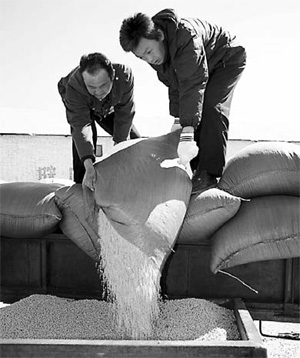The government may soon have to consider measures like subsidies for processors to dispose off its soybean stocks as the fourth national soybean reserves auction held yesterday did not find too many takers, according to analysts.
The situation is likely to be compounded further by an acute storage squeeze, with new crop slated to arrive at the granaries in the next few weeks.

Only less than 10,000 tons of the total 500,000 tons were sold at a price of 3,750 yuan per ton. The nation's granaries currently hold around 5 million tons of soybean.
China Grain Reserves Corporation (Sinograin), the government designated manager for the national grain reserves, has also expressed its concerns on the storage pressure.
"We will not have enough space for the new crops, if we cannot sell the current reserves," said a Sinogarin official on condition of anonymity.
The government will have to take a decision soon in this regard, said Zhang Chunhai, consultant, Heilongjiang Soybean Association.
One of the steps that the government could consider is to move the reserves from the existing storage locations in northern and northeastern China to the warehouses in southern China. But the problem with plan is that it involves high transportation costs.
The logical course for the government is to subsidize soybean processors so that they will buy the reserves.
That plan assumes even more significance considering that most of the processors in southern China are turning to cheap and high-oil-yielding imported genetically-engineered soybeans, said Zhang.
Sinograin had purchased soybeans at 3,700 yuan per ton in 2008 to protect growers when the market price was only around 3,000 yuan per ton. With current prices ruling around 3,750 a ton, the company cannot expect to gain much by holding on to the stocks.
Processors, however, are not too keen on coughing up higher prices for the reserves.
"The acceptable price for us is 3,400 yuan per ton, as we have to spend another 400 yuan for packaging and transportation," said Tian Renli, general manager, Heilongjiang Jiusan Oil & Fat Co, a leading processor.
"Without subsidies we will incur more losses if we buy at the current prices," he said.
"It is good for the government to protect soybean growers. But at the same time they also need to subsidize oil pressers if the prices are too high," said Tian.
Most of the processors argue that the higher than market purchasing price was a goodwill gesture from the government. "It only took into consideration the interests of soybean growers and neglected the entire industry chain and international market," said analysts.
Oil pressers also do not have any compelling reason as to why they should lift domestic stock when imports are more cheaper and accessible, said Wu Xiaodan, analyst, Everbright Securities.
According to data from China National Grain and Oils Information Center, the average price of imported soybean in July was $472 a ton, about 3,752 yuan after tax including cost, insurance and freight.
International soybean prices have slumped sharply due to the financial crisis and thus opened up the floodgates for cheap imports, said analysts.
Customs statistics show that China imported more than 34 million tons of soybeans from January to November 2008, up 22 percent from a year earlier.
Sinograin officials, however, maintain that the current auction price is only the cost price. "All the profit and loss are calculated and shouldered by the government," he said.
(China Daily August 27, 2009)